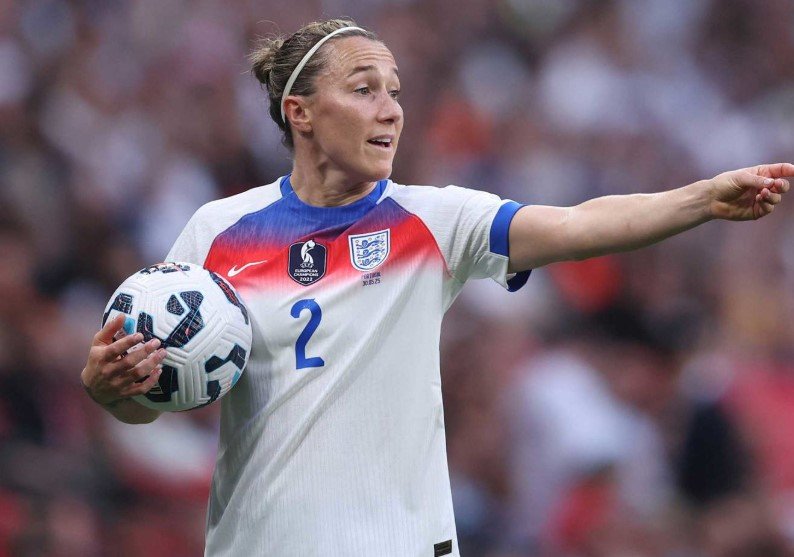England star says online abuse against players like Jess Carter has worsened during Euro 2025, calling it “a stain on a beautiful game”
England’s Lucy Bronze has never been one to hold back. And on a tense summer evening in Zurich, fresh off a gritty quarter-final win at Euro 2025, she did anything but stay quiet.
With a steady voice but glassy eyes, the veteran right-back addressed what’s been hanging over the tournament like a storm cloud: racism. Not tactics. Not injuries. Racism. And not in the men’s game — but in the booming world of women’s football, where things were supposed to be different.
“People think we’re protected from it,” Bronze said. “We’re not.”
Jess Carter targeted as spotlight grows
The issue came to a head when Jess Carter, Bronze’s teammate and Chelsea defender, revealed she had been targeted by racist abuse since the start of the tournament.
One sentence from Carter cracked the room open: “I’m used to it, but it doesn’t make it right.”
Bronze, who has been one of the sport’s most respected voices for over a decade, stepped up. “The bigger the game gets, the bigger the noise becomes,” she said. “We’re obviously open to critics — that’s why we love the sport — but we’re not open to abuse.”
Carter, who has played nearly every minute for England at this year’s Euros, hasn’t missed a step on the pitch. But the emotional toll off it is another story.
“Jess doesn’t want to make it about her,” one FA official said privately. “But she also doesn’t want to stay silent anymore.”

Growth has come with a dark side
It’s not just England. Ask anyone inside women’s football and they’ll tell you — things have changed. For better and for worse.
Attendance is up. Viewership is smashing records. Prize money is (finally) climbing. But the explosion in popularity has also dragged in some of the darker sides of fandom.
And for women of color, that means the online hate has multiplied.
Some of the abuse has been ugly:
-
Racial slurs in comment sections
-
Fake profiles spreading hate
-
Direct messages threatening violence
It’s not isolated, and it’s not slowing down. One UEFA media officer admitted the federation has received “more reports of racist behavior on social platforms this summer than during the last two Euros combined.”
Social media is still a Wild West
While clubs and federations ramp up public campaigns and rainbow armbands, the internet remains largely unregulated — especially in the context of women’s sport.
Instagram and X (formerly Twitter) have both rolled out AI-based filters in recent years. But ask players, and they’ll tell you it’s not enough.
“Sometimes I open my phone and the first thing I see is a monkey emoji,” said one unnamed player in the Dutch camp. “That’s not a filter problem. That’s a hate problem.”
Bronze echoed this sentiment. “It’s clear as day that women’s football is being targeted,” she said. “Especially online. There’s a line, and it’s being crossed every day.”
UEFA and FA both acknowledge issue
UEFA issued a short statement late Sunday night saying it “condemns all forms of racism” and is “actively investigating reported incidents.”
The FA also said it’s working with UEFA and national authorities to support affected players. But many players feel that reactions come too little, too late.
Here’s what the timeline has looked like over the last few major tournaments:
| Tournament | Reported Racist Incidents | Official Sanctions |
|---|---|---|
| Euro 2017 (Women) | 2 | 0 |
| World Cup 2019 | 4 | 1 fine (FIFA) |
| Euro 2022 | 7 | 2 investigations |
| Euro 2025 (ongoing) | 13 (as of July 20) | 0 (so far) |
As one analyst put it, “The sanctions don’t match the scale.”
England squad stands united — but exhausted
Bronze made it clear: the squad is united. But it’s draining. “We talk about it more than we should have to,” she said. “We should be talking about tactics and goals, not trauma.”
Other players including Georgia Stanway and Ella Toone voiced support for Carter, both privately and publicly. But it’s clear the mood in camp has been affected.
“There’s this constant emotional weight,” a team staffer shared. “It’s like you’re prepping for a semi-final with one arm tied behind your back.”
One player, requesting anonymity, added: “We put on a brave face. But this is breaking us.”
Where does it go from here?
Bronze doesn’t pretend to have all the answers. “I don’t have the solution,” she said. “But I know there is one.”
That honesty landed with fans and pundits alike.
“We need tech platforms, governing bodies, clubs, all of them — they need to actually care,” said former England striker Eni Aluko. “Not post a black square. Not a hashtag. Real policy. Real bans.”
Fans have stepped in too. Several have launched mass-reporting campaigns on X, and one England supporter group said they’ve started flagging hateful accounts before kickoff.
Still, the systemic nature of racism in football won’t change overnight.
But maybe, just maybe, something broke through in Zurich. A press conference that wasn’t about a goal or a red card — but about what it means to be seen, and what it costs to be heard.








